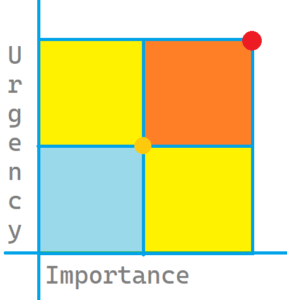Just think for a moment what if every morning a bank gave you ₹ 86,400 just like that! You could spend this money as you like but at the end of the day, whatever money left with you would simply vanish. What would you do in such a case ?
Every day has 86,400 seconds that you can use freely for whatever you would like to do that day. An ordinary student would waste most of the time on unimportant tasks. An astute student like you would manage this gift of time and put it to good use. To do this we have to learn time management.
All tasks that we do in the day can be divided into four categories on the basis of urgency and importance.

Urgent and Important (1) tasks in the orange square: Jobs which are really close to deadlines – like submission of projects, test preparations – you have no choice but to do these important things.
Urgent but not Important (2) tasks in the yellow square to the left of orange square: Any task that you HAVE to do, though not important, like answering a door bell.
Not Urgent but Important (3) in the yellow square below the orange square: Tasks that are to be done by some distant deadline, like doing a project by the end of vacations.
Neither Urgent nor Important (4) tasks lie in the blue square, they are the trivial tasks like Watching TV, playing computer games, chatting on phone and any other tasks that you tend to do for passing the time.
The essence of time management lies in devoting maximum time to the not urgent but important category, of course after urgent and important tasks are handled!. Students should remember to allocate the least time to the Neither Urgent nor Important category. Obviously, right ?
So pick up a pen make a list of all the things that you do in a regular day and sort them in different categories. Now you know where to give time to.
TIP – Not urgent but Important tasks are tiny, till they become urgent as well as important, So, kill the monster while it is small.
ACTION TIME:
List your daily schedule – a TYPICAL day, that is a good representative of the tasks you need to do. Don’t list the schedule of a day you went to a picnic or had a test the next day! Those are special occasions where you don’t have to be a robot.
| Time | Category | Activity |
| 6.00 am | 1 | Maths Revision, I have to Practice at least 10 sums |
| 7.00 | 3 | School |
| 8.00 | 3 | School |
| 9.00 | 3 | School |
| 10.00 | 3 | School |
| 11.00 | 3 | School |
| 12 noon | 3 | School |
| 1.00 | 3 | School |
| 2.00 | 3 | School or Tuition Homework |
| 3.00 | 3 | School or Tuition Homework |
| 4.00 | 3 | Tuition Classes |
| 5.00 | 3 | Tuition Classes |
| 6.00 | 4 | Playing |
| 7.00 | 1 | Science preparation |
| 8.00 | 1 | SST or Languages on Alternate days |
| 9.00 | 4 | Watch TV, Listen to Music, Computer Games |
| 10.00 | – | Sleep |
In the category column, put in the Urgency and Importance level of the thing that you did. Remember that normal activities like doing homework or attending school would be Important but Not Urgent.
Also make sure this table is filled with precision – if you attend school for 6 hours, it doesn’t necessarily mean that you have studied 6 hours! What’s the use of cheating yourself ?
Let’s list the activities that we do and the time we devote – it will give us an idea of the kind of time shift that we need to be.
| Activity | Revision of topics covered in school excluding homework |
| Category | 3 |
| Current | 2 hours |
| Ideal | 4 hours |
| Difference | 2 hours |
Now you know where you need to act upon in your schedule. Now you have to just stick to the schedule on most days!!
Another important thing in life is to do today’s task today & not to procrastinate. Those who postpone today’s work to tomorrow are the one who need time management skills since they are required to perform two days task in one day. But if you complete today’s task on same day you have more avenues waiting to you reward tomorrows as you are free from any burden of task on you.
Some useful tips for completing your task in due time:
- Set Personal Goals.
- Start tiny, be consistent & never ever give up.
- Keep a To-Do List Prioritize your to-do list before you start working on it.
- Manage Distractions, keep FB/ WhatsApp / Cell phone etc away while studying.
- Learn to say no while studying, do not waste your time while helping others.
- Multitasking is good but do not study more than two or three subjects in a day.
- Taking Breaks is important have 5-10 minutes break after 60-90 minutes as per your stamina.
- Review your study 3/4 in days at regular interval to keep check on you that you are moving in right direction.
- Challenge yourself & commit to your Mom/Dad/friend in front of whom you never want to lose.
- Reward yourself when you succeed.
To conclude, start with tiny steps, be consistent , never give up and most important revise, revise and revise …


